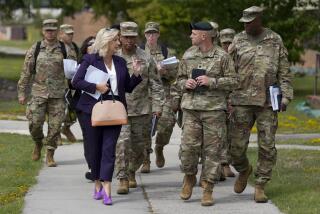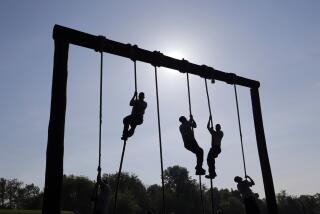Sink or Swim : Coast Guard Recruits Face Demanding Tests on Land, Sea
- Share via
CAPE MAY, N.J. — As it has throughout its history, the U.S. Coast Guard--the smallest U.S. military service with only 38,208 members--is playing a crucial role in the Persian Gulf.
Since the service marked its 200th birthday Aug. 4--the same week that Saddam Hussein’s forces invaded Kuwait--more than 400 Coast Guard personnel have been dispatched to Saudi Arabia.
In addition to providing port security, they have been boarding cargo ships to ensure compliance with the U.N.-sanctioned embargo of Iraq and training U.S. Navy and allied forces in such procedures.
More than 800 vessels have been boarded since the crisis began.
The Coast Guard personnel received instruction at Cape May, at the southernmost tip of New Jersey, the service’s only recruit-training center.
One gulf veteran, Lt. Alvaro Crespo of Santa Barbara, is teaching “the law of war” to recruits here.
Crespo, 36, spent 75 days in the gulf, from August to October, verifying that cargo on foreign ships did not violate the United Nations ban.
The “law of war” course is just one part of classroom training for Coast Guard recruits, all of whom come to Cape May for eight weeks of basic training.
Other classes focus on seamanship, marksmanship, Coast Guard history and physical fitness. A total of 750 recruits, about 10% of them women, are now in training.
Tony Giambruno, a 20-year-old from Temple City, Calif., explained as he practiced a life-jacket drill that he joined the service “to save lives. . . . I joined, too, because a few of my idols served in the Coast Guard, guys like (actor) Tom Selleck.”
Not surprisingly, to serve country and humanity and to save lives are the main reasons recruits give for enlisting.
“The Coast Guard is a military organization,” said Capt. Ken Allington, 46, commanding officer of the recruit training center, “but its prime peacetime mission is public service, search and rescue and saving lives, enforcing laws on the high seas--drug interdiction, fishing laws, etc.--aids to navigation, lighthouse maintenance, ice breakers, pollution control, marine inspections,”
The Coast Guard’s duties are vital, Allington said.
“These young people can make a difference in this country,” he added. “There are not too many jobs that can say that.”
About 12% of the recruits drop out, primarily for medical and psychological reasons.
But of those who complete training, nearly all sign up for four-year enlistments.
“They come here couch potatoes, out of shape, with 55% failing the initial physical fitness test, 30% failing the initial swim test,” explained Chief Bo’s’n Mate Glenn Heathcote, 39, the center’s physical training director.
Swimming is particularly important, he added, because guard personnel are “always working on water. We go into water to save lives. They have to be able to swim 100 meters and stay afloat five minutes treading water in order to graduate.”
Most graduates are assigned to vessels, as small as 18-footers or as large as 400-foot ice breakers.
Tami Dicket of Tucson, smartly attired in her dress blues at a recent graduation, said she transferred to the Guard after 3 1/2 years in the Air Force.
“I switched to the Coast Guard because I looked forward to going to sea,” said Dicket, 24.
For many, being in the Coast Guard is a family tradition.
Allington’s father, for example, was a career guardsman, and Allington’s 22-year-old son, Mike, is now attending the Coast Guard Academy in New London, Conn.
A life-size statue of a hero guardsman that was unveiled here last fall depicts Signalman 1st Class Douglas A. Munro, the service’s only Congressional Medal of Honor winner, who was killed in 1942 at the Battle of Guadalcanal.
The Coast Guard was at its peak during World War II with 170,000 members.
Munro, of Cle Elum, Wash., provided cover for 200 Marines being evacuated to rescue ships as they were overwhelmed by Japanese forces ashore.
He was shot and killed after dramatically maneuvering his small boat so that he was exposed to fire.
According to legend, his last words were in the Coast Guard tradition of lifesaving:
“Did they all get off the beach?”
More to Read
Sign up for Essential California
The most important California stories and recommendations in your inbox every morning.
You may occasionally receive promotional content from the Los Angeles Times.













